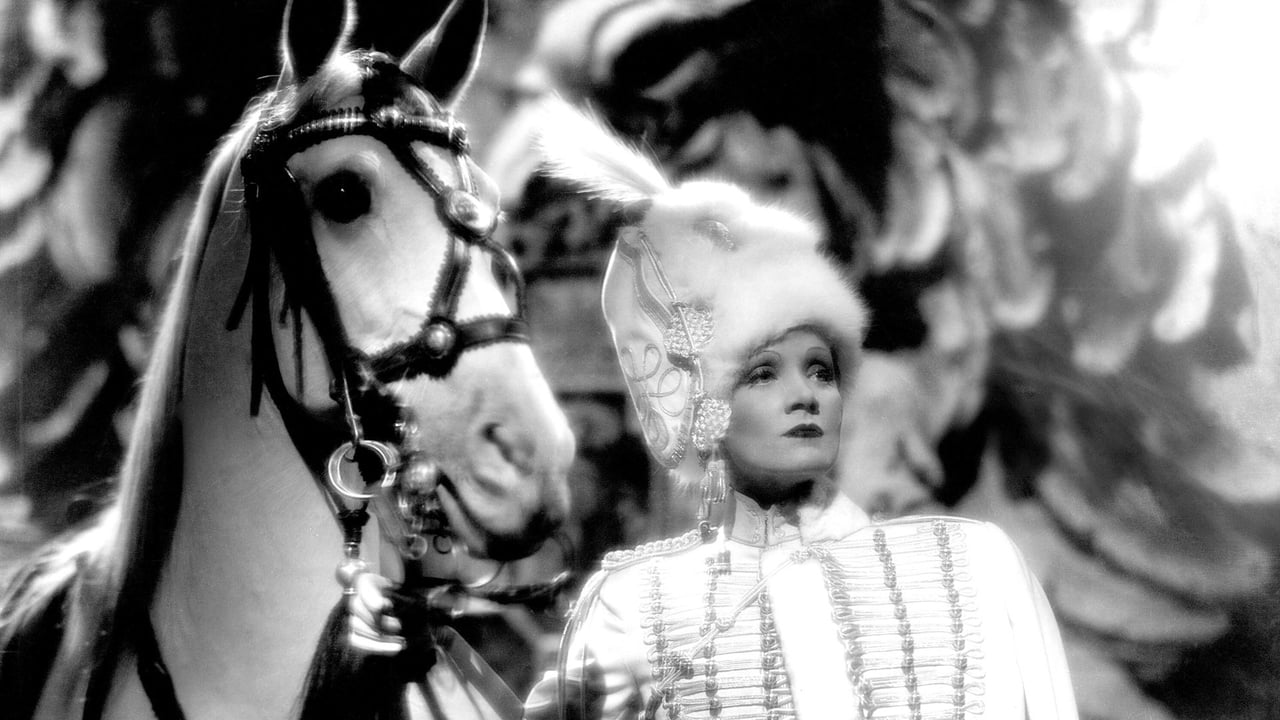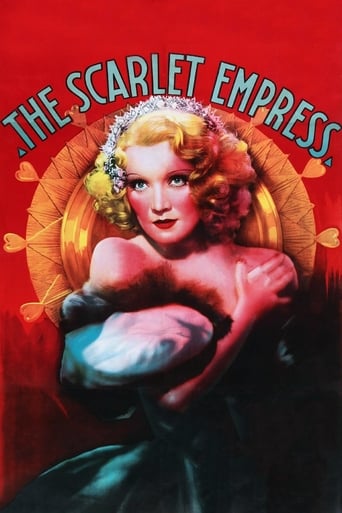

The penultimate collaboration of the iconic and justifiably famous partnership of Marlene Dietrich and director Josef Von Sternberg is to me one of their best, also perhaps the most entertaining and most visually beautiful.Historical accuracy is not to be expected here, anybody expecting a truthful account of Catherine the Great's life are better off reading a biography. Taken on its own terms as a film, 'The Scarlet Empress' really impresses and 83 years on is still a great film, what shocked audiences back in 1934 (some of the content is ballsy and ahead of its time) fascinates many now. Where 'The Scarlet Empress' fares least is in the script, some of which going a bit over-the-top on the nonsensical weirdness. Which may disappoint anybody who loved the archness and sophistication of the writing of other Dietrich/Sternberg films like 'Shanghai Express'.Otherwise, any debits are far outweighed by the strengths and the size of those strengths. Visually, 'The Scarlet Empress' looks amazing, the production design is staggering in its ornate richness, the cinematography is classy and atmospheric while evoking typically and shockingly lustrous images and the use of light and shadow in the lighting is trademark Sternberg (who also directs as adroitly as ever).Another element that amazes is the music. Not just the music itself, with pieces of Tchaikovsky, Mendelssohn and Wagner with some of their most famous work and justly so, but also the way it was used. It's constant but music that could easily have been little more than clumsily inserted "popular classical music favourites" has real atmosphere and dramatic power and is used so cleverly. For back in 1934 this use of music was certainly unique, and even now in 2017 'The Scarlet Empress' continues to be one of the most ingenious uses of music, classical or otherwise, on film.Regardless of any historical inaccuracy, the story is entertaining in its outrageousness while also capturing a real sense of period, a sense of wonder unique regardless of any decade or era and the lusts and intrigues of the court. What could have been completely thankless or caricature characters are interesting and beautifully played. Dietrich certainly lives up to the film's tag-line, she has had so many unforgettable moments on film and her performance in 'The Scarlet Empress' remains her at her most enviously luminous. She is also very commanding on screen, confident and moving even if at times the innocence could have had a softer touch.She is very well supported by a thrillingly demented but also soulful Sam Jaffe and a formidable Louise Dresser. John Lodge holds up better on repeat viewing, while nowhere near in the same league as Dietrich, Jaffe and Dresser in no way does he disgrace himself either, far from it.In summary, a great film. 9/10 Bethany Cox
... View MoreThe historical drama about the life of Catherine the Great. Director and screenwriter were certain to follow historical facts. Historical freedoms in this case is not pure fiction. Pronounced humor and love life at the court confirmed this fact. I am afraid that this film sort of response from Marlene Dietrich to film Queen Christina.THE SCARLET EMPRESS is a bit bizarre and extravagant movie with highlighted specific humor and a touch of sexual intrigue. At the heart of the story is that Catherine II very well played by the ravishing Marlene Dietrich. I'm not too thrilled with the story, but I think that the atmosphere and the scenery are great. I liked this wacko world who like to live a nightmare in grotesque environment full of menacing shadows, a bunch of candles and skeleton. Costumes really leaves an impression. Maybe I'm too long looking at Marlene. Von Sternberg me at times sympathetic, because all lots of attention paid to the lead actress. I understand that the film is about "her" character. It is hard to understand anything, if in a scene missing Dietrich.Marlene Dietrich (Catherine II – The Great) behaves as if it does not affect overall madness. It is a world that is untouchable for other characters. She's beautiful and erotic to the limits of madness. Sex games and erotic expressions are fields in which Marlene Dietrich dominates.John Davis Lodge (Alexei), Sam Jaffe (Peter III) and Louise Dresser (Empress Elizaveta) are observed and presented their roles very good. I believe that this is in addition to Marlene was difficult.The Scarlet Empress is open and suggestive film in which Marlene Dietrich picked all the attention through his portrayal of Queen Catherine the Great a beautiful and innocent girl with large eyes in the beginning, and later the great seductress who comes across her bed to the throne.
... View MoreThis is Von Sternberg's work - this characterization alone is almost enough to describe this picture. As always, the great Master revels in his love for opulence, grand settings, theatrical acting, sex, intrigues, and violence; and since "The Scarlet Empress" was one of the last pictures to 'escape' the full enforcement of the Production Code, he can do so once more without almost ANY restriction.It's nothing like a historical movie, of course - except that it goes roughly along the real events in the 17th century: the young German princess Sophia is summoned by the Russian empress Elizabeth to marry her half-wit son and bring some 'fresh blood' into the decadent czarist line. And Marlene Dietrich is a WONDERFUL sight throughout all the picture: how she 'develops' from the innocent young girl that's still hoping for a beautiful prince into a disillusioned, willful, lustful woman; in the beginning she's almost shocked by the advances of the good-looking count Alexej, who turns out to be one of the greatest heart-breakers of the court - but the longer she's forced to live with her literally abominable demented husband, the new Czar, the more she gets to like the idea that 'every woman in the court has got her lovers'; and so she virtually 'commandeers' all the army officers - something which will help her a lot in the counter-intrigue she's forced to spin against the deadly intrigues of her 'husband'...So this is a REAL pre-Code movie (and certainly one of the most pompous and extravagant of all) - and it's got a very interesting and unique aspect to it concerning sex: here, the MEN are the 'sex objects', not only for the formerly innocent Sophia, who's become reckless and randy Catherine - but even for the lustful old empress Elizabeth! The only one who'd shown a similar 'attitude' in pre-Code movies was Mae West... (Who'd in fact wanted very much herself to make a movie about Catherine the Great, but Von Sternberg beat her to it; well, she turned her own ideas into a stage play later on...) So, as far away from any kind of reality as it may be - enjoy it as a Hollywood 'fairy tale' (of the 'nasty' kind...); it's one of the most entertaining ones ever made!
... View MoreHistorically speaking, the film must count as one of the grossest abominations in a Hollywood which for the longest time envisioned anything laying east and south of the Danube as uncharted, barbarous darkness. Young Catherine arrives in Russia practically a child, only to be greeted by the scoldings of another overbearing mother, an Orthodox patriarch perched beneath an ungodly gargoyle, and a half-mad imbecile for a husband.The whole of the Russian court turns out to be not much different from the vile stories of atrocity she was narrated to as a child, one after another a series of machinations at the hands of the half-mad.But of course history was never the purpose for Sternberg, these stories at the beginning of the film he visualizes in the manner of pages from a book. So a fiction malformed from history, a book of images, ostensibly based on the diaries of the real person, in turn a history malformed from the real thing, with Dietrich stage center, shining, radiant.It was always Dietrich that validated film for Sternberg, the image of seductive beauty that could seduce beauty from the camera. But in several ways, I feel that Sternberg deteriorated upon joining up with her much like the hapless professor in Blue Angel. His art was tortured before, anguished with emotion, but since Dietrich it seemed to be solely consumed by her at the expense of all else.Nowhere is this more evident than here, no pretense about it anymore. Dietrich is quite literally queen, destined to be, and the whole thing around her merely provides the tortured circumstances for the scene of triumph. There is so much cacophony when she does finally triumph that it makes you think Sternberg has finally gone unhinged from so much pained adoration, that he doesn't quite know when to separate one feverish fantasy from his own. A cavalcade storms inside the palace and up the expansive staircase, a bell rings, ringing bells across the country, crowds rejoice, that were earlier silently praying, and Dietrich is finally ushered on shoulders into the church swarmed with banners on all sides to be crowned empress. Ride of the Valkyries clangs away in bombast for the duration.But this is the thing that strikes the most vividly, the crowning luxurious decadence of the whole enterprise. Even in the grip of what seems like lovestruck paroxysm, Sternberg could envision farther than most at the time. And when he failed, he failed more spectacularly than anyone could, in the most interesting ways to see.It baffles. It exhilarates with the sheer monstrosity of the caricature. It overwhelms any sensibility that is fine, any sense of good taste. You will never see more a outrageous depiction of an Orthodox church ever, the frescoes of saints bordering on a surreal that is blasphemous. Or more styrofoam gargoyles in one studio lot palace.So the frame is overflowing with anguished, fiendish luxury; but everything that is grossly portrayed here, was actually taking place on that studio lot. Whatever was going on in 18th century Russia, at least this thing was actually happening in Hollywood, that would go to such lengths to envision and stage such a dazzling darkness. A cavalcade was made to storm up a staircase. And there was this woman at the center, flickering before the camera like the flame of the candle she holds at one scene, finally lighting up the place.So it is apt to recast the whole thing as Dietrich's journey, mirrored from the other, from her faraway home into the court of a foreign country, with every spotlight on her, every male pair of eyes.The first part is sourced out as a kind of Alice in Wonderland; the girl enters a strange world, apprehensive, fearful, a world that would reduce her to size, where she must fit through doors too big, wait for the queen or lose her head, finally descend into a rabbit hole and come out the other end the mother of a heir.But in the second part she becomes the Dietrich we know and have come to see conquer with fierce beauty, the Lola that first broke hearts in Blue Angel; the whole film around her transforms into the restless dream that men were dreaming about her. The idea is that she becomes that dream, operating the image from inside. It is not a good film all else considered, the overcooked bombast, the intertitles that never shy away from revealing the full implications of the most obvious detail, but it's a mess you should see, just for how madly passionate.
... View More